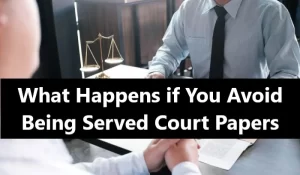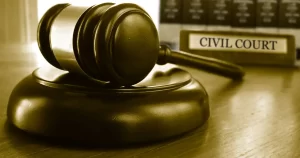What are drug courts?
Drug courts are specialized court programs focused on helping eligible defendants with drug-related charges receive mandated addiction treatment rather than incarceration or traditional forms of punishment. They aim to help participants recover from substance abuse issues and avoid future arrests and legal issues. Judges, prosecutors, defense attorneys, probation officers, case managers, and treatment providers work together as a drug court “team” to provide multidisciplinary support tailored to individual needs.
How drug courts function
In a drug court program, participants appear before the dedicated drug court judge on a regular basis for judicial status hearings and supervision of their treatment and recovery progress. The hearings become less frequent as the participant progresses through the phases of the program. Incentives and sanctions may be utilized to motivate compliance with program rules and terms. Participants are closely supervised via frequent and random drug testing. The average drug court program duration is 12 to 18 months. Upon successful graduation, the pending criminal charges may be dismissed or significantly reduced.
Benefits of drug courts
Proponents argue that drug courts provide a range of benefits compared to typical case processing. These include:
- Reduced recidivism rates and repeat offenses
- Lower costs and resource burdens on courts and corrections
- Higher motivation for treatment completion via incentives
- Improved family relationships due to treatment
- Educational and vocational gains for participants
Criticisms and controversies
However, drug courts also have critics who highlight potential issues like:
- Insufficient due process protections for participants
- Low statistical rates for graduation success
- Concerns over coerced treatment methods
- Net widening and drawing more people into the justice system
Drug Courts in California
Overview of CA drug court system
California has one of the largest networks of drug courts in the U.S. As of 2022, there were nearly 150 adult drug courts active statewide. California also has juvenile drug courts, DUI/DWI courts, family/dependency courts, and other specialized models. State legislation has provided funding streams and grants to encourage county courts to establish drug court divisions.
Key stats on participation
In 2021, California drug courts had a total enrollment exceeding 21,000 participants. Well over 328,000 Californians have entered drug court programming since the first drug court launch in 1991. In 2019, over 4,000 participants successfully graduated from CA drug courts. Performance audits indicate CA drug courts have generally met key outcome benchmarks like reduced recidivism rates.
Unique aspects and programs
Some innovative California drug court elements include opt-out college education tracks, homeless court initiatives to dismiss infractions blocking housing/employment, veteran’s courts, tribal wellness courts on reservations utilizing native culture, and federal reentry courts to smooth transitions post-incarceration.
Effectiveness data
UCLA research found participants who declined enrollment in CA drug courts were two times more likely to reoffend than those who completed drug court. Cases managed in drug courts rather than traditional courts show 37% less recidivism on average as well as 40% lower costs.
Getting Into a CA Drug Court Program
Eligibility requirements
While specific eligibility guidelines vary across CA counties, common requisites for admission into drug court may include current non-violent drug offense charges, substance dependency documented via clinical assessment, county residency status, no exclusionary prior convictions, availability of treatment options, and judicial discretion over appropriateness for the program.
Application and acceptance process
Referral sources to apply for drug court typically include defense attorneys, judges, probation officers, prosecutors, family members, and direct defendant request. The drug court team then reviews submitted petitions and assesses eligibility via background checks, verification of charges/criminal history, clinical evaluations, and review of mitigating factors. An admission agreement outlining the program requirements is then drafted if accepted.
Terms and conditions
CA drug court participation hinges on accepting the admission agreement stipulating requirements like:
- Pleading guilty/no contest to pending charges
- Waiving speedy trial rights
- Attending regular status review hearings
- Undergoing random weekly drug screening
- Completing court-mandated therapies
- Avoiding any subsequent arrests
- Permitting home visits from probation officer
Completing Drug Court Requirements
Mandatory elements
While some variability exists, core components marking completion across California drug courts may include:
- Documented period of sobriety (ex. 90 consecutive days)
- Steady employment or school enrollment
- Secured stable housing
- Payment of fines and fees
- Completion of community service hours
- Proof of constructive lawful behavior
Phases and milestones
Most CA drug courts utilize a 4-phase model with advancement tied to progress milestones like:
- Phase 1: Orientation, treatment plan development, weekly review hearings
- Phase 2: Curfew changes, less frequent review hearings
- Phase 3: Fewer random drug tests, focus on vocations/education
- Phase 4: Graduation preparation and transition planning
Support programs and resources
CA drug courts connect participants to resources assisting needs like:
- Job and vocational assessment/readiness workshops
- Temporary transitional housing placements
- Transportation vouchers for fulfilling requirements
- Healthcare enrollment guidance
- Parenting education classes
- Domestic violence counseling
- Emergency fund access
Common challenges and obstacles
Difficulties participants may encounter include:
- Securing stable, drug-free housing
- Affording expenses like fees, fines, etc.
- Handling work or family obligations
- Mental health issues (anxiety, trauma, lack of coping skills)
- Ongoing triggers and cravings for substances of past use
Graduating From Drug Court
What graduation entails
To graduate in CA, drug court participants must:
- Complete all program phases and requirements
- Document period of self-sufficiency
- Attend graduation review hearing for judges’ final approval
Benefits and incentives
Potential rewards upon drug court graduation include:
- Case dismissal (charges dropped)
- Charge reductions with lighter sentences
- Record expungements (arrest/conviction history erased)
- Lifted probation terms and lowered supervision
- Family/child custody reestablishment
Graduation rates data
Estimates suggest 1 in 4 CA drug court participants will graduate within 3 years. Success rates range from 50-60% in some counties to over 70% in others. Those who fail to advance through phases may not graduate before hitting maximum allowed program durations (typically 2+ years).
Leaving Drug Court Without Graduating
Potential reasons for leaving early
Commitment breaks causing early exits include:
- Post-intake continued substance use
- Criminal re-offenses/re-arrests
- Absconding from the program
- Sent to jail due to serious non-compliance
- Health reasons disrupting participation
- Voluntary decision to quit participating
Voluntarily quitting drug court
Participants may elect to voluntarily leave drug court prematurely by:
- Verbally asking the judge for self-termination
- Submitting a formal written request to exit
- Pleading guilty to original charges to close the case
Getting dismissed from the program
Involuntary termination occurs via:
- Judicial decisions to remove low-performers
- Hitting caps for sanctions like jail time
- Testing positive for banned substances repeatedly
- Committing program violations despite interventions
Consequences and outcomes
Non-graduates revert to traditional court processing and sentencing, such as:
- Guilty/no contest plea enforcement
- Fines and incarceration penalties
- Probation assignment to corrections
- Additional court-ordered requirements
how to get out of drug court without going to jail
Understanding revocation and termination
If drug court participation is revoked or ended prematurely, pre-negotiated plea bargains kick in carrying guaranteed punishments, frequently involving jail time. Participants lose all leverage and negotiating power they had prior to enrollment.
Following probation terms fully
Any existing probation Sentences stemming from past cases or the current charges also go back into effect after leaving drug court, requiring meticulous compliance with probation conditions to avoid violations triggering jail time.
Seeking legal guidance if struggling
Consulting defense lawyers for advice and direction can be invaluable if challenges meeting drug court or probation demands start accumulating. Attorneys may intervene to mitigate damages.
Navigating Drug Court Without an Attorney
Is legal representation necessary?
Since public defenders already handle the drug court docket, obtaining private counsel is generally unnecessary. However, for complex cases or if advocacy issues emerge, hiring personal drug court lawyers can offer useful customized support.
Obtaining affordable legal advice
If needing extra guidance but lacking funds, options like requesting court-appointed counsel, contacting legal aid clinics, or seeking pro bono representation from defense associations may offer some assistance. Carefully vet any free advice to ensure competence.
Handling hearings and meetings
Without a dedicated attorney, navigate drug court hearings/meetings by:
- Asking straightforward logistical questions about requirements
- Seeking clarification if confused but avoid complaining
- Admitting faults honestly when addressed by the judge
- Bringing up serious issues politely outside the courtroom if needed
Getting Your Case Dismissed Before Completion
Eligibility for early case dismissal
Although atypical, early graduation criteria used by some CA courts could allow dismissal if all terms are exceptionally satisfied much faster than normal (usually 1+ years). These are high bars to reach.
The dismissal petition process
Participants believing they merit early graduation can formally petition the court to review their case. Expect to undergo scrutiny including:
- Oral questioning from judge and team
- Investigation into full compliance claim
- Updated assessments like drug testing
Dealing with opposition if applicable
Prosecutors or other team members may resist early dismissals in some cases. Be prepared to highlight strengths of the petition and negotiate compromises to overcome objections by detractors.
Using Formal Appeals to Your Advantage
Ground for appeals while in drug court
Appealing within drug court itself has narrow criteria, mostly related to rights violations (denial of counsel access/due process) or evidentiary issues in sentencing (disputes over factors determining sanctions like jail time).
The appeals process and timeline
Filing formal notice of appeal pauses the drug court process until resolution. The case gets scheduled with the State Appellate Court and requires extensive written legal arguments. The appeals timeline averages 12-18 months until a decision.
Tips for effective appeals
Maximize appeal success by:
- Acting fast within strict deadline windows
- Having strong procedural footings for the appeal argument
- Demonstrating clear prejudice from alleged violations
- Submitting supporting evidence and affidavits
Utilizing Informal Complaint Options
Voicing grievances to the drug court team
Calmly discuss discrete issues about unfair or counterproductive elements with staff like case managers or probation officers during private meetings first. See if concerns get addressed without needing formal filings.
Submitting formal written complaints
For more serious recurring problems, detail grievances in complaint letters to the drug court judge instead of vocalizing in open court review hearings. Provide very specific examples and suggested remedies.
Potential benefits and risks
Voicing grievances judiciously carries potential upsides like gaining concessions, aid, or policy changes from staff. Know complaints perceived as manipulative could also spark stricter penalty impositions too.
Seeking Release From Jail After Revocation
Bail and pretrial release options
If jailed after termination, pursue pretrial freedom aggressively via bail bonds or release on recognizance. File requests urgently highlighting enrollment documentation of employment, residence, and family ties.
Getting sentences reduced or dismissed
Argue for applying the often significant amount of time already spent complying in drug court toward reducing expected incarceration sentences after revocation. Demonstrate reentry progress made even if program completion failed.
Parole consideration after serving time
Upon imprisonment from revoked drug court pleas, work zealously on early release via parole boards or alternative custody options. Showcase sobriety advancements, participation history, and any evidence of rehabilitation.
Understanding Your Legal Rights and Protections
Right to due process
Drug court staff must still uphold civil liberties like transparent processes before imposing sanctions. If violations seem evident, demand protection and retain an attorney adept at constitutional precedents.
Rights against unlawful search and seizure
While home visits or intensified monitoring occurs via probation, limitations still exist on search rights. Seek counsel immediately if violations like assaults, denied warrants, or planted evidence transpire.
Other constitutional and federal rights
Arguments leveraging illegal discrimination, ADA laws regarding disabilities accommodations, private health data confidentialities, or religious expression infringements may also provide platforms to defend rights within drug court contexts if breaches seem substantiated.
Conclusion
Key takeaways
California drug courts offer opportunities for addiction treatment instead of standard sentencing. But securing dismissal of charges requires completing rigorous supervision and mandates. Prematurely leaving drug courts risks steep sanctions, yet some options exist to still mitigate outcomes like incarceration depending on individual circumstances. Further developing personal stability and self-advocacy abilities can support overcoming hurdles if enrolled.
Final thoughts and recommendations
Ultimately drug court aims to heal individuals and improve public safety, but it demands tremendous personal responsibility and compliance discipline to reap the benefits rather than allowing taxing requirements to compound legal problems. Having supportive allies and resources can make or break one’s chances. Stay focused on the end goals, make no excuses for partial efforts, believe in yourself, and success can be within reach.
FAQs
Can I get kicked out of drug court?
Yes, committing repeated violations of drug court mandates like failed drug tests, missed appointments, sanctions accumulations, or new arrests are grounds for termination. Judges hold discretion over involuntary discharge decisions.
How often do drug courts drug test?
Expect two or more random urine tests weekly in early phases. Frequency drops slightly in later phases assuming continued demonstrated sobriety. Technologies like continuous alcohol monitoring and hair follicle testing may also be used.
What happens if I fail drug court?
Flunking out via termination or voluntary departure equates to waiving all rights negotiated in entry pleas. Original case punishments like fines, probation, or jailing per sentencing guidelines typically resume in traditional court, often harsher than if compliance had continued.
Can I ask for an attorney while in drug court?
Yes, both public defenders and private defense counsel may be requestable in some cases to assist with advocating interests or protecting rights if issues emerge during participation. Judges can appoint attorneys if needed.
How can friends and family support drug court participation?
Loved ones help mostly by respecting program rules, offering encouragement, participating in counseling sessions if appropriate, helping meet basic needs, providing accountability through stewardship support, and celebrating milestone achievements.








